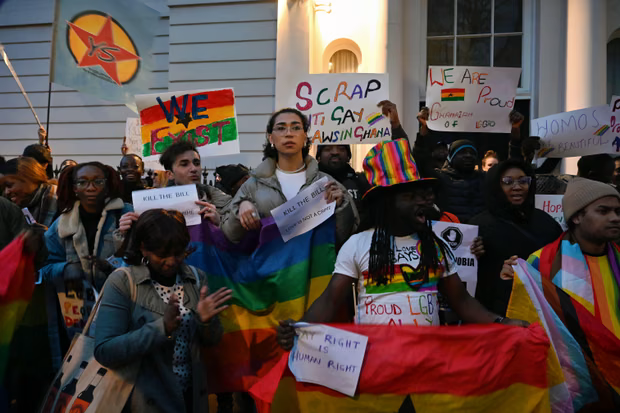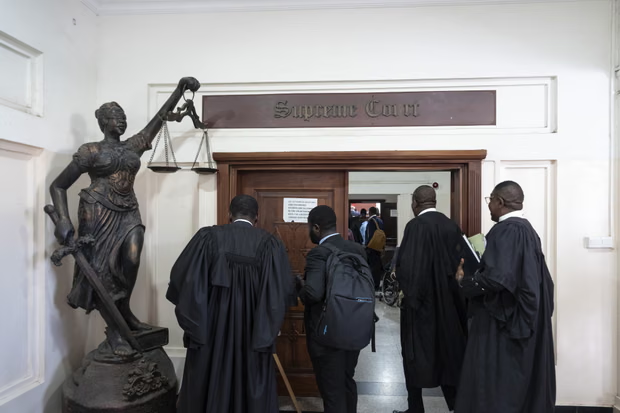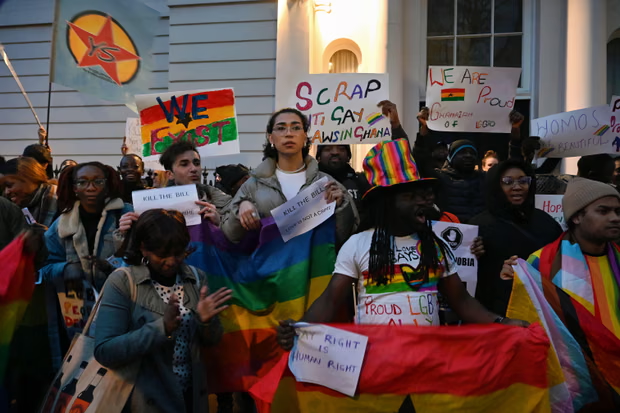When Delali, a 25-year-old Ghanaian-Nigerian chef, joined the dating app Grindr in early 2019, she knew she was taking a risk. For transgender women in Accra, Ghana’s bustling capital, online dating had long been a dangerous venture. Still, curiosity and hope led her to create a profile. Within hours, messages flooded in. One man seemed genuine enough to meet in person.
That meeting would change her life. After following him to a dimly lit building, Delali suddenly found herself trapped. Two strangers burst in, flashlights and cameras in hand, recording her every move. “It felt like a nightmare,” she recalls. For three agonizing hours, she was beaten, humiliated, and robbed. Her attackers threatened to expose her to her family, friends, and the police.
Delali’s story is not unique. Across Ghana, hundreds of LGBTQ+ people—especially gay men, bisexual men, and trans women—are falling victim to criminal networks that exploit widespread homophobia and transphobia. Using dating apps such as Grindr and social media platforms like TikTok, Facebook, and WhatsApp, these gangs pose as potential romantic partners, lure victims to isolated locations, and subject them to violence, blackmail, and public shaming.
According to Ebenezer Peegah, director of the advocacy group Rightify Ghana, perpetrators often record assaults and forced confessions, circulating them online for profit or notoriety. “These videos drive traffic and engagement,” Peegah explains, “but they also fuel further violence.”
The situation worsened after Ghana’s parliament passed the Human Sexual Rights and Family Values Bill in February 2024. Though same-sex relations were already criminalized, the new legislation proposed even harsher penalties—up to 10 years in prison for promoting or distributing LGBTQ+ content.
Former President Nana Akufo-Addo refused to sign the bill into law, citing constitutional concerns. Yet activists argue the damage was already done. The debate around the so-called anti-gay bill unleashed a surge of hate speech, misinformation, and political scapegoating.
A recent Rightify Ghana report reveals that during the 2024 presidential campaign, politicians weaponized homophobic rhetoric to court conservative voters. The bill was reintroduced in March 2025, reigniting public hostility.

Reported attacks have skyrocketed. Rightify documented over 300 cases in 2024—three times the previous year’s figure—and more than 120 in the first half of 2025 alone. Peegah believes the true number is much higher, as many victims remain silent out of fear, shame, or mistrust of the police.
For those who do seek help, the justice system often deepens the trauma. Reports from Amnesty International and the U.S. Department of State describe police indifference and, in some cases, further extortion or abuse. “Survivors are re-victimized by the very people meant to protect them,” Peegah says.
LGBTQ+ activist and musician Wanluv the Kubolor notes that Ghana’s worsening economic situation has also made queer people targets. “When poverty is this high, some see the queer community as easy prey,” he explains. “It’s a less risky way to make money than other crimes.”
Among the most disturbing trends is the viral spread of hate-fueled videos. In one case, a 14-year-old boy was brutally attacked by eight men who forced him to strip, dance, and chant “I am gay” in the local language. The video circulated widely on TikTok before removal—but not before it inspired a wave of digital cruelty.
Between April and May 2025, more than 12,000 TikTok posts reused the audio from the assault, often under hashtags like #kofigay and #kofitrumutrumu, with users applying AI filters to mock the child. At the height of the trend, the “Kofi Dance Challenge” emerged, encouraging others to mimic the abuse on camera.

Rightify Ghana linked the viral trend to at least three copycat assaults, where victims were forced to repeat the same degrading acts. “It became a template for humiliation,” Peegah says.
After being contacted by, TikTok removed the offensive hashtags, stating it prohibits hate speech and the sharing of private sexual content. But the damage, activists say, underscores how major platforms continue to fail vulnerable users in countries where anti-LGBTQ+ sentiment is both cultural and systemic.
Despite international condemnation, Ghana’s queer community remains under siege—from the streets, from the law, and increasingly, from the internet. Behind every viral clip or anonymous profile lies a story like Delali’s: one of betrayal, violence, and survival in a digital landscape turned weapon.
“I just wanted to meet someone who understood me,” she says quietly. “But instead, I met the worst parts of what this country thinks of people like me.”



